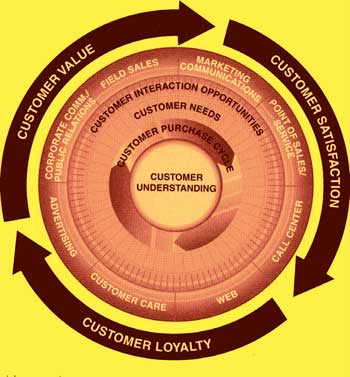Reply To:
Name - Reply Comment


We now know that if you want your company become successful, you need to find the right level of aggregation—to categorize your customers in segments that are neither too big nor too small. Consider you are selling LCD TVs and decide to segment the market as follows: household income, age of head of household, gender of head of household, education level of the head of household and households with a major home improvement.
You plan to send different messages to each of these groups and the customer relationship management (CRM) system simplifies the process of personalizing the contents of the message to suit the segment. Some of the content for the segments may be the same (i.e., company information) while other parts of the content will be tailored to suit the specific segment.
In this simple example, market segmentation has been combined with personal information so that you go one-on-one with each customer. Thus, the messages are tailored to groups of adequate size but customers perceive that the offer fits their individual needs. Although it is a literal contradiction, this CRM approach uses mass-personalization or the ability to tailor a message to large numbers
of people.

To a great extent, business markets may be segmented by use of variables similar to the ones just discussed. The difference, of course, is that instead of using characteristics and behaviour of the individual consumer, CRM approaches use characteristics and behaviours of people within organisations.
B2B approach
Obviously, firms should not target or spend money on undesirable customers because these segments have a poor purchase history and low expectations of any purchases in the future. In contrast, premium customers exhibit a good purchase history and a high probability of continued loyalty to the firm.
You also need to prospect customers who may have little or no past purchase history with the company but exhibit a high potential for value in the future. They need to be cultivated even if the company loses money in the short run.
Within business-to-business (B2B) exchanges, the momentum is focused on understanding the needs of proactive buyers who are seeking joint efforts with different parties in the supply chain. While there are many benefits to be gained from using information technology to track needs and facilitate exchanges, the B2B market is characterized by smaller numbers and more
personalized interactions.
A fundamental principle of CRM is that all customers are not the same. Marketing strategy becomes effective and efficient when managers realize that CRM is based on the idea of treating different customers differently.
Strategies
There are three strategies for dealing with customers: unsegmented mass marketing, market segmentation and custom marketing. Unsegmented mass marketing treats all customers the same. With custom marketing, each individual customer receives personalized treatment.
Effectiveness of marketing one-on-one is high but so are marketing costs. The crucial process, which not many enterprises have yet mastered, is to find the right level of aggregation—
to categorize customers in groups that are neither too big nor too small.
We also learned that experienced customers are in the driver’s seat, expecting increasingly valuable experiences from their providers. CRM can only provide your company with the customer differential if you have won the loyalty and advocacy of your customers. In that respect, CRM is all about the customer experience.
While this sounds like a fairly straightforward concept, consistently optimizing each customer’s experience with your company is no small undertaking. There are several critical aspects of company that impact the customer’s experience. The Customer Experience Cycle (see Figure) provides an overview of what is involved.
This cycle begins in the centre. The customer experience begins with the customer. Assessing the customer experience must begin with an understanding of unique customer groups and their related characteristics and behaviours. The customers’ experience with you and their perceptions of your company and your ability to implement CRM strategies will vary depending on who those customers are.
For example,
Are your customers individuals within households or does the household form a buying entity?
Are your customers primarily businesses? If so, who within the business influences the purchase? Who initiates the purchase?
What are your customers’ buying characteristics and preferences?
What is the history of your relationship with each customer?
How do they prefer to interact with you?
What are their purchase and related spending patterns?
What is their current and potential value to your organisation?
Which of their needs are you currently fulfilling? Which needs are you not fulfilling today? Who is fulfilling those needs?
Why did your customers choose you over your competitors?
How do your customers differ from your competitors’ customers?
What are your customers’ overall satisfaction levels with various aspects of your organisation and offerings? What are their expectations?
Based on these factors, how many unique segments of customers do you have? What are the critical differentiators?
Which customer segments are most valuable to your organisation and why?
Answers to these and many other questions drive all of your CRM investments and strategies.
Addressing these essential issues, however, takes significant time and effort because this information is rarely readily available. Ongoing data collection efforts should be pursued as a means of populating and maintaining key customer information. Customer profiling and segmentation efforts will then provide a continued means of monitoring the composition of your customer base and the characteristics of unique customer segments. These efforts are addressed further in
subsequent instalments.
Needless to say, this initial customer understanding is the basis for evaluating the customer experience with your organisation. More broadly speaking, this customer understanding provides the foundation for all of your CRM efforts.
(Lionel Wijesiri, a corporate director with
over 25 years’ senior managerial experience, can be contacted at [email protected])